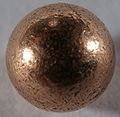Money must be a medium of exchange, unit of account and measure of wealth.
As a medium of exchange, money must be widely accepted. Ideally it should be universally accepted to eliminate the need to exchange it for other money. To be widely accepted in the modern world, it must be digitally transferable yet secure.
As a unit of account, money must be countable in consistent units.
As a measure of wealth, money must retain its value relative to other commodities.
Rare commodities make the best money, because little is required to exchange for a lot of another commodity. Historically, gold has been the most fungible commodity. It is easily divided and combined without loss, but it is not digitally transferable.
Gold unitized as coins is more easily exchanged and accounted and helps avoid fraud, but the issuing governments found they could artificially increase their wealth and ability to wage war by shaving the coins or otherwise reducing their gold or silver content to make more coins. The monetary inflation devalued the money, and thereby destroyed the economy, which often led to the demise of the government.
When gold was rare relative to other commodities, the smallest coin often bought more of a commodity than was desired, so silver was used to provide smaller denominations of money, yet be of sufficient size to avoid accidental loss. Unfortunately, those overburdened with loans motivated an increase in the supply of silver coins in excess of their demand to devalue the money used to repay the loans. Furthermore, silver is more chemically reactive than gold.
Paper representations of gold coins on deposit are more readily produced, making it much easier to devalue the currency if there is no alternative paper currency to depreciate the inflated paper currency. Hence, paper designated as money by fiat of governments under penalty of fines and imprisonment is at best an uncertain measure of wealth.
With the availability of inexpensive and small test kits, a better solution is non-monetized specie, like grams of gold, but a gram is difficult to handle.
As of 2007, there was about $12,500,000,000,000 Federal Reserve Notes or their digital equivalent in the world. All the gold ever mined amounts to 125,000 tonnes or 12,500,000,000 grams. That amounts to $1000/gram or $28,350/ounce.
A standard BB is 0.44 to
0.45 mm in diameter. It has a volume of 0.046 mm3.
Shown here is a copper BB enlarged 67 times (click image
for larger view). The density of gold is 0.019
g/mm3, so
a BB of gold would weigh 0.413 grams. Given the dominant role
of the Federal Reserve Note as a reserve currency, a low value for a BB
of gold would be $413, assuming Federal Reserve Notes were the
only currency.
It has a volume of 0.046 mm3.
Shown here is a copper BB enlarged 67 times (click image
for larger view). The density of gold is 0.019
g/mm3, so
a BB of gold would weigh 0.413 grams. Given the dominant role
of the Federal Reserve Note as a reserve currency, a low value for a BB
of gold would be $413, assuming Federal Reserve Notes were the
only currency.
As of 2007, the United States Treasury (Ft. Knox) and Federal Reserve Banks have only 8,134 tonnes or 8,134,000,000 grams of gold. That amounts to $1,537/gram or $43,566/ounce, so a gold BB may be worth as much as $3,722, or more if counterfeit Federal Reserve Notes were not included in the counts, and the gold is not salted with tungsten.
Silver BBs could be used for trades of lesser value. Silver and gold BBs would be easy to handle and count for personal use, and weigh for commercial use. They could be the standard specie of deposit for free banks, which would enable the digital trade of gold and silver BBs.
Goldmoney.com is a step in that direction. It enables transactions in gold and silver, but as with banks, depositors need as much assurance as possible that there is no fractional reserve banking, that the specie does in fact exist, and it is separated in individual accounts.If periodically visiting your bank to confirm the specie in your account is inconvenient, imagine banks that use webcams to allow you to remotely see your clear plastic cylinders of gold and silver BBs with your name and account etched into the cylinders. Imagine you can see the net weight of the cylinders as displayed on scales and a corresponding count of your BBs. Imagine you can watch as BBs from a trade are added to or debited from your account. Imagine that you can have BBs delivered to a physical address as well as shuffled among cylinders and banks, including your address for future "cash" transactions. Imagine that you periodically have delivered to you or an independent company some of your BBs for an assay of your specie. Imagine that banks with bad reputations or insurance go out of business while banks with good reputations or insurance prevail.